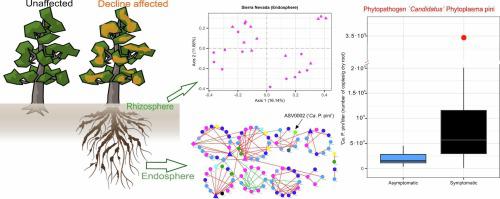当前位置:
X-MOL 学术
›
Sci. Total Environ.
›
论文详情
Our official English website, www.x-mol.net, welcomes your feedback! (Note: you will need to create a separate account there.)
Mediterranean pine forest decline: A matter of root-associated microbiota and climate change
Science of the Total Environment ( IF 9.8 ) Pub Date : 2024-03-22 , DOI: 10.1016/j.scitotenv.2024.171858 Ana V. Lasa , Antonio José Fernández-González , Pablo J. Villadas , Jesús Mercado-Blanco , Antonio J. Pérez-Luque , Manuel Fernández-López
Science of the Total Environment ( IF 9.8 ) Pub Date : 2024-03-22 , DOI: 10.1016/j.scitotenv.2024.171858 Ana V. Lasa , Antonio José Fernández-González , Pablo J. Villadas , Jesús Mercado-Blanco , Antonio J. Pérez-Luque , Manuel Fernández-López

|
Forest ecosystems worldwide currently face worrying episodes of forest decline, which have boosted weakening and mortality of the trees. In the Mediterranean region, especially in the southeast Iberian Peninsula, forests are severely affected by this phenomenon, and it has been commonly attributed to drought events. Remarkably, the role of root microbiota on pine decline has been overlooked and remains unclear. We therefore used metabarcoding to identify the belowground microbial communities of decline-affected and unaffected pine trees. Taxonomic composition of bacterial and fungal rhizosphere communities, and fungal populations dwelling in root endosphere showed different profiles depending on the health status of the trees. The root endosphere of asymptomatic trees was as strongly dominated by ‘ Phytoplasma pini’ as the root of decline-affected pines, accounting for >99 % of the total bacterial sequences in some samples. Notwithstanding, the titer of this phytopathogen was four-fold higher in symptomatic trees than in symptomless ones. Furthermore, the microbiota inhabiting the root endosphere of decline-affected trees assembled into a less complex and more modularized network. Thus, the observed changes in the microbial communities could be a cause or a consequence of forest decline phenomenon. Moreover, ‘. Phytoplasma pini’ is positively correlated to decline events, either as the primary cause of pine decline or as an opportunistic pathogen exacerbating the process once the tree has been weaken by other factors.
中文翻译:

地中海松林衰退:根相关微生物群和气候变化的问题
全世界的森林生态系统目前面临着令人担忧的森林衰退,这加剧了树木的衰弱和死亡。在地中海地区,特别是伊比利亚半岛东南部,森林受到这种现象的严重影响,通常将其归因于干旱事件。值得注意的是,根部微生物群对松树衰退的作用一直被忽视且仍不清楚。因此,我们使用元条形码来识别受衰退影响和未受影响松树的地下微生物群落。根据树木的健康状况,细菌和真菌根际群落的分类组成以及居住在根内圈的真菌种群表现出不同的特征。无症状树木的根内圈与受衰退影响的松树的根部一样,以“松植原体”为主,占一些样本中总细菌序列的 99% 以上。尽管如此,有症状的树木中这种植物病原体的滴度比无症状的树木高四倍。此外,栖息在受衰退影响的树木根内圈的微生物群组装成一个不太复杂且更加模块化的网络。因此,观察到的微生物群落的变化可能是森林衰退现象的原因或结果。而且, '。松树植原体与衰退事件呈正相关,它要么是松树衰退的主要原因,要么是一旦树木因其他因素而衰弱,就会作为机会性病原体加剧这一过程。
更新日期:2024-03-22
中文翻译:

地中海松林衰退:根相关微生物群和气候变化的问题
全世界的森林生态系统目前面临着令人担忧的森林衰退,这加剧了树木的衰弱和死亡。在地中海地区,特别是伊比利亚半岛东南部,森林受到这种现象的严重影响,通常将其归因于干旱事件。值得注意的是,根部微生物群对松树衰退的作用一直被忽视且仍不清楚。因此,我们使用元条形码来识别受衰退影响和未受影响松树的地下微生物群落。根据树木的健康状况,细菌和真菌根际群落的分类组成以及居住在根内圈的真菌种群表现出不同的特征。无症状树木的根内圈与受衰退影响的松树的根部一样,以“松植原体”为主,占一些样本中总细菌序列的 99% 以上。尽管如此,有症状的树木中这种植物病原体的滴度比无症状的树木高四倍。此外,栖息在受衰退影响的树木根内圈的微生物群组装成一个不太复杂且更加模块化的网络。因此,观察到的微生物群落的变化可能是森林衰退现象的原因或结果。而且, '。松树植原体与衰退事件呈正相关,它要么是松树衰退的主要原因,要么是一旦树木因其他因素而衰弱,就会作为机会性病原体加剧这一过程。



























 京公网安备 11010802027423号
京公网安备 11010802027423号